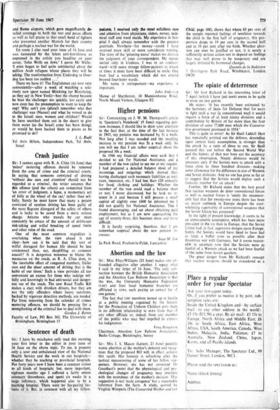Sentence of death
Sir: I have by mischance only read this morning your first letter to the editor in your issue of 16 June on the above topic. To me, it presents only a sour and unbalanced view of the National Health Service and the work in our hospitals— whether they be teaching or provincial hospitals. For forty years now I have been a constant visitor to all kinds of hospitals; but, more important, eighteen months ago I suffered a fairly severe coronary thrombosis. and spent six weeks in a large infirmary, which happened also to be a teaching hospital. There were no fee-paying sec- tions of it. But, in common with all my fellow-
patients, I received only the most solicitous care and attention from physicians, sisters, nurses, tech- nical staff and ward maids. My experience in hos- pital I shall always remember with the greatest gratitude. Nowhere—for money—could I have received more skill or more considerate nursing. The story of the 'grinning nurse' makes me distrust the judgment of your correspondent. My nurses smiled only in kindness. I was in an ordinary ward—with some strange fellow-patients to sshom at times it must have been difficult to smile. One man had a vocabulary which did not extend beyond four-letter words.
My name is unimportant—my experience is important.
John Anderson Manse of Shettleston, 10 Mansionhouse Road. North Mount Vernon, Glasgow E2










































 Previous page
Previous page